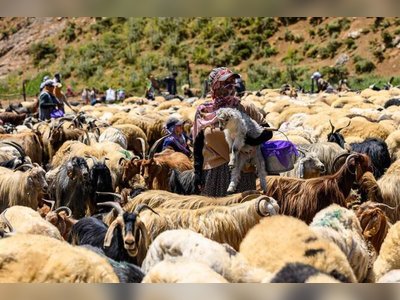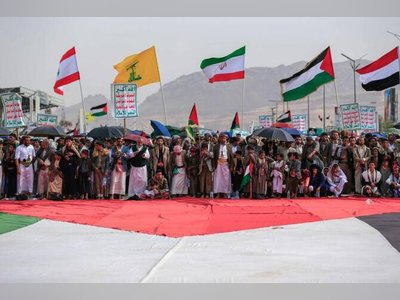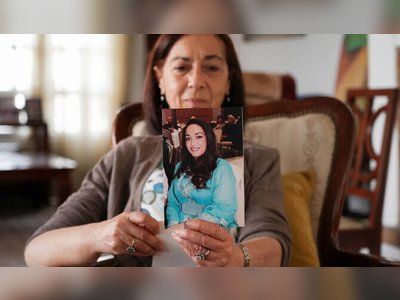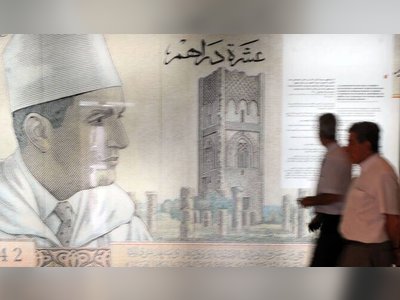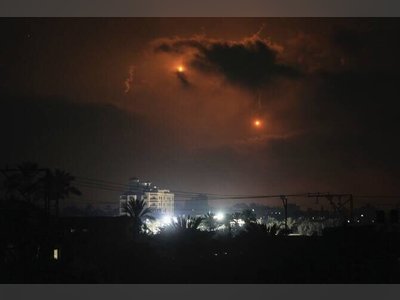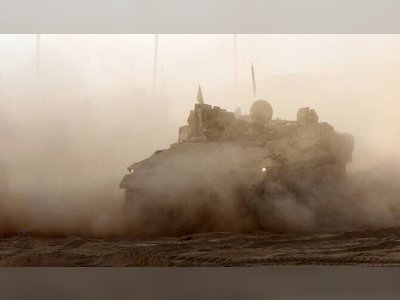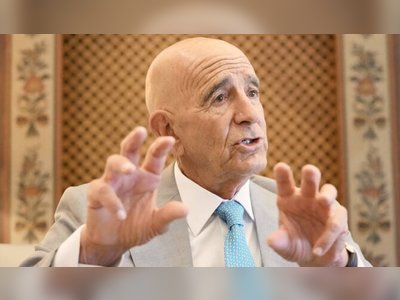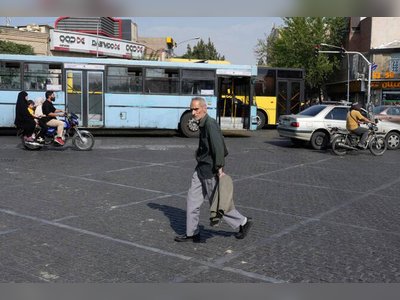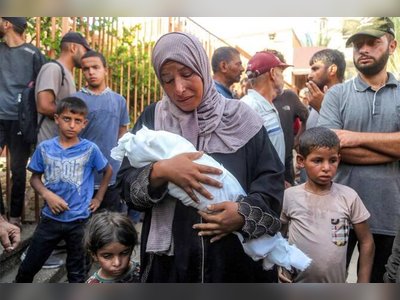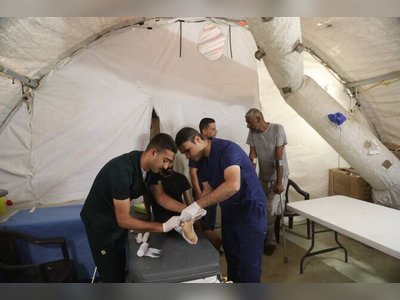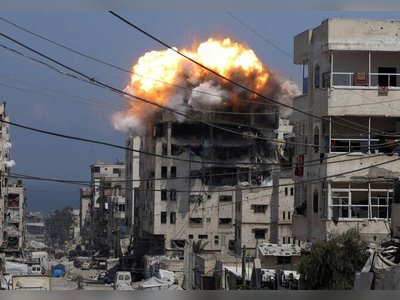
Why Lebanon's Fragile State Hinges on Hezbollah's Next Move
The US and its allies are pressuring Lebanon's new government to disarm Hezbollah, but the process is fraught with difficulty.
As pressure intensifies on Lebanon’s new government to resolve the question of Hezbollah’s arms, it confronts a fundamental challenge: Can the Iran-backed group relinquish its military wing and become a purely political party?
And if it does, will Lebanon’s state institutions and political culture prove capable of supporting such a transition?Earlier this month, Tom Barrack, the US ambassador to Turkiye and special envoy for Syria, telegraphed Washington’s growing impatience with the status quo in Lebanon in remarks to journalists following his visit to Beirut.
He described Hezbollah’s disarmament as an essential condition for the renewal of international financial aid and long-term political stability in Lebanon.As part of a proposal presented to Lebanese officials, the US offered support for Lebanon’s economic reform efforts in exchange for Hezbollah’s complete disarmament, Israeli withdrawal from Lebanese territory, and the release of Lebanese detainees held by Israel.“If Lebanon doesn’t hurry up and get in line, everyone around them will,” Barrack said.
He acknowledged what he described as a “spectacular” response from Beirut in a short time, but criticized the Lebanese political system’s ingrained culture of “delay, detour, and deflect,” saying time was running out for the country to adapt to a fast-changing regional order.But disarming Hezbollah is far from straightforward.
Despite suffering significant losses last year during its war with Israel, including the death of longtime leader Hassan Nasrallah and the destruction of much of its military infrastructure, Hezbollah has shown no willingness to give up its arms.The World Bank has estimated the cost of Lebanon’s reconstruction at $11 billion.
(AFP)The group’s new leader, Sheikh Naim Qassem, reiterated that stance in a video address on July 19.
“We will not surrender or give up to Israel; Israel will not take our weapons away from us,” he said.According to him, any disarmament would be discussed only as part of a national defense strategy determined internally by Lebanon, and only after a complete Israeli withdrawal from Lebanese territory.That position is tied to continued Israeli airstrikes, including recent attacks in the south that killed two individuals on July 20, as per local media reports.Hezbollah cites these violations, along with Israel’s continued occupation of five positions seized after the November 2024 ceasefire, as justification for retaining its arms.Although the group claims to have handed over 190 of its 265 southern military positions to the Lebanese army, it continues to maintain a significant arsenal in the region and in other strongholds.Hezbollah emerged as Lebanon’s most powerful military force and dominant political actor in the post-civil war era, representing a significant portion of the Shiite population alongside the Amal party.
Together, the two groups hold all the 27 Shiite seats in the 128-member parliament.Analysts say that Hezbollah’s ideological foundation has long rested on armed resistance, so shifting toward civilian politics would require not only strategic recalculation but also a new political message capable of sustaining its popular base.Lebanese army troops patrol the destroyed southern border village of Adaisseh.
(AFP)“For decades, the party has emphasized armed resistance against Israel as central to its appeal,” said David Wood, senior analyst on Lebanon at the International Crisis Group (ICG).“If Hezbollah wants to transition into a normal political party, it will need to craft another electoral narrative based around how it can improve the socio-economic fortunes of its constituents.”Such a transformation is not without precedent.
Other armed movements in the region, such as the Palestinian Fatah in earlier decades, have evolved into political organizations.
However, the Lebanese context is unique in many ways.
Years of economic collapse, institutional paralysis and political gridlock have left the state too weak to assert its authority.The November 2024 ceasefire, brokered by the US and France, was intended to revive the terms of UN Resolution 1701, which calls for Israeli withdrawal from all Lebanese territory, a halt to Hezbollah’s military operations near the southern border, and full control of arms by the Lebanese state.
But little progress has been made.Bilal Saab, associate fellow in the Middle East and North Africa Program at Chatham House, expressed doubt over Hezbollah’s ability to function effectively as a conventional political party.
He pointed to signs of waning support in southern Lebanon and other Hezbollah strongholds.The group’s military losses, the destruction of southern villages, and the economic suffering in Hezbollah-controlled areas are undermining its grassroots support, Saab told Arab News.
“It is therefore unclear whether an unarmed Hezbollah could compete effectively in free elections, within Lebanon’s complex political system.”For Lebanon’s new leadership under President Joseph Aoun, left, and Prime Minister Nawaf Salam, the challenge is to preserve national stability while dealing with an increasingly polarized domestic landscape and pressure from powerful external actors.
(AFP)He said the obstacles ahead of the government are political willingness and “exaggerated” fears of sectarian violence.
The new leaders, he said, “must recognize that the chances of sectarian tensions are higher with the status quo unchanged.”According to Saab, lack of serious action to address the issue of Hezbollah’s arms would prompt Israel to continue its attacks and cause more damage and human casualties.
“If that happens, war-weary and economically dispossessed Lebanese could blame Hezbollah for causing even more death and destruction.
This would in turn increase the risk of sectarian violence and people taking up arms against Hezbollah and its supporters,” he said.For Lebanon’s new leadership under President Joseph Aoun and Prime Minister Nawaf Salam, the challenge is to preserve national stability while dealing with an increasingly polarized domestic landscape and pressure from powerful external actors.Though both leaders have reiterated their commitment to imposing a state monopoly on arms, they have insisted that any progress depends on Israel’s complete withdrawal from Lebanese territory and an end to violations of Lebanese sovereignty.While Barrack’s proposal received praise for its ambition, its feasibility depends on wider geopolitical considerations.
Paul Salem, senior fellow at the Middle East Institute, believes that Iran, Hezbollah’s principal backer, will have the final say.“The key decision of disarming Hezbollah would have to be made in Iran, the group’s main backer, not in Lebanon,” he told Arab News.
“For the time being, it is clear that Tehran is encouraging Hezbollah to drag its feet and not to hand over all its arms and I think that will remain the case.”Salem emphasized the need for a coordinated domestic and international effort to encourage Hezbollah’s transition into a political entity.
This, he said, would require guarantees from the US, a defined role for the LAF, and political assurances from the Arab Gulf states.“Hezbollah, at a minimum, would need assurances about Israel’s withdrawal and protection of its operatives in Lebanon, which would have to come from the US, as well reassurances from Gulf countries of aid for reconstruction of the war-ravaged areas,” Salem said.“They would want some of that money to come through their auspices so they could benefit politically.”The World Bank has estimated the cost of Lebanon’s reconstruction at $11 billion.
US and Gulf officials have indicated that significant portions of that aid will only be unlocked if Hezbollah agrees to disarm.Lebanese emergency responders inspect the debris at the site of a reported Israeli strike on a vehicle in Khaldeh, south of the capital Beirut.
(AFP)The issue of integrating Hezbollah supporters into Lebanon’s broader political and economic fabric is also paramount.
Wood emphasized that the process of disarming Hezbollah should come with assurances that the Shiite community would remain part of the nation-building process in a country long paralyzed by factional politics.“Lebanon’s leaders must think very carefully about how to fully integrate Hezbollah’s supporters into the country’s future, or else they risk creating dangerous fissures in Lebanese society,” the ICG’s Wood said.Despite mounting pressure, few expect a quick resolution.
Reports suggest Hezbollah is conducting a strategic review of its military posture, exploring possible scenarios but delaying concrete action.
“Hezbollah is taking a ‘wait and see’ approach for now,” Wood said.
“Perhaps it wants to know if regional circumstances might improve for it before seriously entertaining the idea of surrendering its military wing.”Meanwhile, the Lebanese army has consolidated control over Rafik Hariri International Airport and large parts of the south, improving state authority and border security.
A successful disarmament, officials argue, would boost the credibility of Lebanon’s institutions and the case for the state’s monopoly on force.The Middle East Institute’s Salem cautioned that Hezbollah is unlikely to fully relinquish its arms without assurances that go beyond Lebanese borders.
If anything, he said, the disarmament would reduce sectarian tensions “with the Sunnis, Christians, Druze and other communities that have been afraid of Hezbollah’s arms.”Firefighters work at the site of an Israeli drone attack in the southern Lebanese village of Kfar Roumman.
(AFP)The potential rewards for Lebanon are clearly substantial.
Hezbollah’s disarmament would enable Lebanon to form new alliances with regional and global partners.
The disarmament process could also unlock vital economic assistance, helping the country recover from years of political paralysis, financial crisis and social unrest.However, Lebanon’s leadership remains caught between the demands of the international community and the compulsions of domestic sectarian politics.
For now, a delicate balance holds.
But as pressure builds, time may be running out for Lebanon’s politicians to chart the country’s future — before others do it for them.
And if it does, will Lebanon’s state institutions and political culture prove capable of supporting such a transition?Earlier this month, Tom Barrack, the US ambassador to Turkiye and special envoy for Syria, telegraphed Washington’s growing impatience with the status quo in Lebanon in remarks to journalists following his visit to Beirut.
He described Hezbollah’s disarmament as an essential condition for the renewal of international financial aid and long-term political stability in Lebanon.As part of a proposal presented to Lebanese officials, the US offered support for Lebanon’s economic reform efforts in exchange for Hezbollah’s complete disarmament, Israeli withdrawal from Lebanese territory, and the release of Lebanese detainees held by Israel.“If Lebanon doesn’t hurry up and get in line, everyone around them will,” Barrack said.
He acknowledged what he described as a “spectacular” response from Beirut in a short time, but criticized the Lebanese political system’s ingrained culture of “delay, detour, and deflect,” saying time was running out for the country to adapt to a fast-changing regional order.But disarming Hezbollah is far from straightforward.
Despite suffering significant losses last year during its war with Israel, including the death of longtime leader Hassan Nasrallah and the destruction of much of its military infrastructure, Hezbollah has shown no willingness to give up its arms.The World Bank has estimated the cost of Lebanon’s reconstruction at $11 billion.
(AFP)The group’s new leader, Sheikh Naim Qassem, reiterated that stance in a video address on July 19.
“We will not surrender or give up to Israel; Israel will not take our weapons away from us,” he said.According to him, any disarmament would be discussed only as part of a national defense strategy determined internally by Lebanon, and only after a complete Israeli withdrawal from Lebanese territory.That position is tied to continued Israeli airstrikes, including recent attacks in the south that killed two individuals on July 20, as per local media reports.Hezbollah cites these violations, along with Israel’s continued occupation of five positions seized after the November 2024 ceasefire, as justification for retaining its arms.Although the group claims to have handed over 190 of its 265 southern military positions to the Lebanese army, it continues to maintain a significant arsenal in the region and in other strongholds.Hezbollah emerged as Lebanon’s most powerful military force and dominant political actor in the post-civil war era, representing a significant portion of the Shiite population alongside the Amal party.
Together, the two groups hold all the 27 Shiite seats in the 128-member parliament.Analysts say that Hezbollah’s ideological foundation has long rested on armed resistance, so shifting toward civilian politics would require not only strategic recalculation but also a new political message capable of sustaining its popular base.Lebanese army troops patrol the destroyed southern border village of Adaisseh.
(AFP)“For decades, the party has emphasized armed resistance against Israel as central to its appeal,” said David Wood, senior analyst on Lebanon at the International Crisis Group (ICG).“If Hezbollah wants to transition into a normal political party, it will need to craft another electoral narrative based around how it can improve the socio-economic fortunes of its constituents.”Such a transformation is not without precedent.
Other armed movements in the region, such as the Palestinian Fatah in earlier decades, have evolved into political organizations.
However, the Lebanese context is unique in many ways.
Years of economic collapse, institutional paralysis and political gridlock have left the state too weak to assert its authority.The November 2024 ceasefire, brokered by the US and France, was intended to revive the terms of UN Resolution 1701, which calls for Israeli withdrawal from all Lebanese territory, a halt to Hezbollah’s military operations near the southern border, and full control of arms by the Lebanese state.
But little progress has been made.Bilal Saab, associate fellow in the Middle East and North Africa Program at Chatham House, expressed doubt over Hezbollah’s ability to function effectively as a conventional political party.
He pointed to signs of waning support in southern Lebanon and other Hezbollah strongholds.The group’s military losses, the destruction of southern villages, and the economic suffering in Hezbollah-controlled areas are undermining its grassroots support, Saab told Arab News.
“It is therefore unclear whether an unarmed Hezbollah could compete effectively in free elections, within Lebanon’s complex political system.”For Lebanon’s new leadership under President Joseph Aoun, left, and Prime Minister Nawaf Salam, the challenge is to preserve national stability while dealing with an increasingly polarized domestic landscape and pressure from powerful external actors.
(AFP)He said the obstacles ahead of the government are political willingness and “exaggerated” fears of sectarian violence.
The new leaders, he said, “must recognize that the chances of sectarian tensions are higher with the status quo unchanged.”According to Saab, lack of serious action to address the issue of Hezbollah’s arms would prompt Israel to continue its attacks and cause more damage and human casualties.
“If that happens, war-weary and economically dispossessed Lebanese could blame Hezbollah for causing even more death and destruction.
This would in turn increase the risk of sectarian violence and people taking up arms against Hezbollah and its supporters,” he said.For Lebanon’s new leadership under President Joseph Aoun and Prime Minister Nawaf Salam, the challenge is to preserve national stability while dealing with an increasingly polarized domestic landscape and pressure from powerful external actors.Though both leaders have reiterated their commitment to imposing a state monopoly on arms, they have insisted that any progress depends on Israel’s complete withdrawal from Lebanese territory and an end to violations of Lebanese sovereignty.While Barrack’s proposal received praise for its ambition, its feasibility depends on wider geopolitical considerations.
Paul Salem, senior fellow at the Middle East Institute, believes that Iran, Hezbollah’s principal backer, will have the final say.“The key decision of disarming Hezbollah would have to be made in Iran, the group’s main backer, not in Lebanon,” he told Arab News.
“For the time being, it is clear that Tehran is encouraging Hezbollah to drag its feet and not to hand over all its arms and I think that will remain the case.”Salem emphasized the need for a coordinated domestic and international effort to encourage Hezbollah’s transition into a political entity.
This, he said, would require guarantees from the US, a defined role for the LAF, and political assurances from the Arab Gulf states.“Hezbollah, at a minimum, would need assurances about Israel’s withdrawal and protection of its operatives in Lebanon, which would have to come from the US, as well reassurances from Gulf countries of aid for reconstruction of the war-ravaged areas,” Salem said.“They would want some of that money to come through their auspices so they could benefit politically.”The World Bank has estimated the cost of Lebanon’s reconstruction at $11 billion.
US and Gulf officials have indicated that significant portions of that aid will only be unlocked if Hezbollah agrees to disarm.Lebanese emergency responders inspect the debris at the site of a reported Israeli strike on a vehicle in Khaldeh, south of the capital Beirut.
(AFP)The issue of integrating Hezbollah supporters into Lebanon’s broader political and economic fabric is also paramount.
Wood emphasized that the process of disarming Hezbollah should come with assurances that the Shiite community would remain part of the nation-building process in a country long paralyzed by factional politics.“Lebanon’s leaders must think very carefully about how to fully integrate Hezbollah’s supporters into the country’s future, or else they risk creating dangerous fissures in Lebanese society,” the ICG’s Wood said.Despite mounting pressure, few expect a quick resolution.
Reports suggest Hezbollah is conducting a strategic review of its military posture, exploring possible scenarios but delaying concrete action.
“Hezbollah is taking a ‘wait and see’ approach for now,” Wood said.
“Perhaps it wants to know if regional circumstances might improve for it before seriously entertaining the idea of surrendering its military wing.”Meanwhile, the Lebanese army has consolidated control over Rafik Hariri International Airport and large parts of the south, improving state authority and border security.
A successful disarmament, officials argue, would boost the credibility of Lebanon’s institutions and the case for the state’s monopoly on force.The Middle East Institute’s Salem cautioned that Hezbollah is unlikely to fully relinquish its arms without assurances that go beyond Lebanese borders.
If anything, he said, the disarmament would reduce sectarian tensions “with the Sunnis, Christians, Druze and other communities that have been afraid of Hezbollah’s arms.”Firefighters work at the site of an Israeli drone attack in the southern Lebanese village of Kfar Roumman.
(AFP)The potential rewards for Lebanon are clearly substantial.
Hezbollah’s disarmament would enable Lebanon to form new alliances with regional and global partners.
The disarmament process could also unlock vital economic assistance, helping the country recover from years of political paralysis, financial crisis and social unrest.However, Lebanon’s leadership remains caught between the demands of the international community and the compulsions of domestic sectarian politics.
For now, a delicate balance holds.
But as pressure builds, time may be running out for Lebanon’s politicians to chart the country’s future — before others do it for them.
